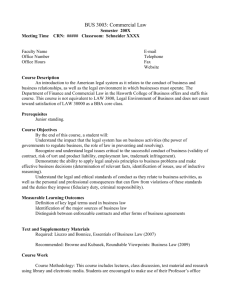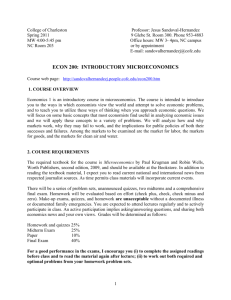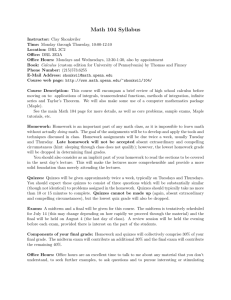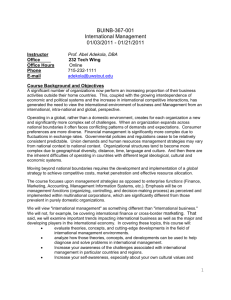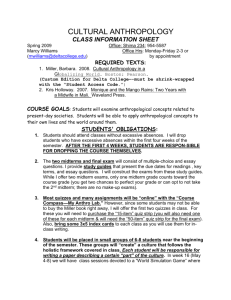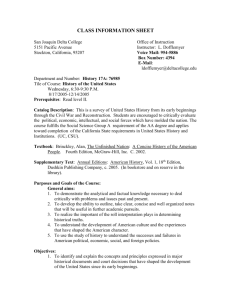History 112 - Saint Louis University
advertisement
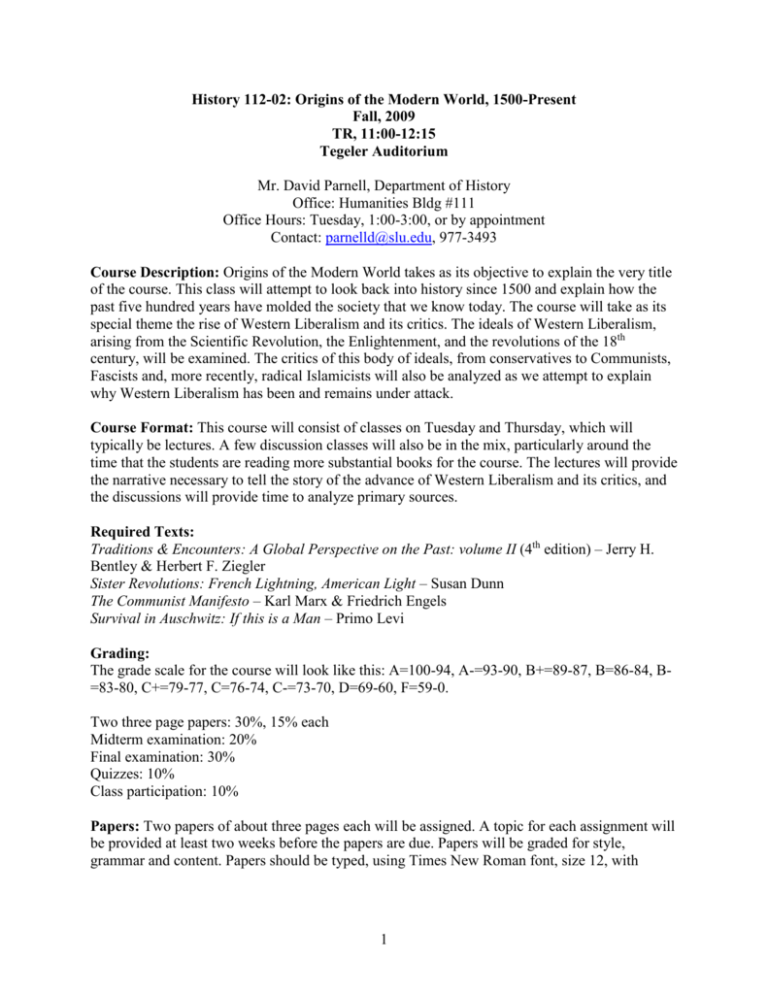
History 112-02: Origins of the Modern World, 1500-Present Fall, 2009 TR, 11:00-12:15 Tegeler Auditorium Mr. David Parnell, Department of History Office: Humanities Bldg #111 Office Hours: Tuesday, 1:00-3:00, or by appointment Contact: parnelld@slu.edu, 977-3493 Course Description: Origins of the Modern World takes as its objective to explain the very title of the course. This class will attempt to look back into history since 1500 and explain how the past five hundred years have molded the society that we know today. The course will take as its special theme the rise of Western Liberalism and its critics. The ideals of Western Liberalism, arising from the Scientific Revolution, the Enlightenment, and the revolutions of the 18th century, will be examined. The critics of this body of ideals, from conservatives to Communists, Fascists and, more recently, radical Islamicists will also be analyzed as we attempt to explain why Western Liberalism has been and remains under attack. Course Format: This course will consist of classes on Tuesday and Thursday, which will typically be lectures. A few discussion classes will also be in the mix, particularly around the time that the students are reading more substantial books for the course. The lectures will provide the narrative necessary to tell the story of the advance of Western Liberalism and its critics, and the discussions will provide time to analyze primary sources. Required Texts: Traditions & Encounters: A Global Perspective on the Past: volume II (4th edition) – Jerry H. Bentley & Herbert F. Ziegler Sister Revolutions: French Lightning, American Light – Susan Dunn The Communist Manifesto – Karl Marx & Friedrich Engels Survival in Auschwitz: If this is a Man – Primo Levi Grading: The grade scale for the course will look like this: A=100-94, A-=93-90, B+=89-87, B=86-84, B=83-80, C+=79-77, C=76-74, C-=73-70, D=69-60, F=59-0. Two three page papers: 30%, 15% each Midterm examination: 20% Final examination: 30% Quizzes: 10% Class participation: 10% Papers: Two papers of about three pages each will be assigned. A topic for each assignment will be provided at least two weeks before the papers are due. Papers will be graded for style, grammar and content. Papers should be typed, using Times New Roman font, size 12, with 1 margins of one inch. Late papers will be docked one letter grade per day they are late, unless documents are provided to prove a medical emergency or death in the family. Midterm: A midterm examination will take place on October 15th. The midterm may include multiple choice, identifications, maps, and/or essays. Make-up exams are not permitted, unless documents are provided to prove a medical emergency or death in the family. Final: The final examination will take place on December 10th at 12:00pm. The final will concentrate on the last part of the semester but will include at least one question covering the entire course. It will consist of identifications and essays. A study guide will be provided. Class Participation: As interaction is crucial to learning, students are highly encouraged to participate in class by asking questions and joining in on discussion when appropriate. Attendance is a basic prerequisite for such participation, so 5% of the student’s grade will be based on attendance. After three unexcused absences, the attendance portion of the student’s grade will drop by one letter grade. Another 5% of the student’s grade will be based on his or her level of participation in classroom discussions. Quizzes: Four quizzes will be given over the course of the semester, based on the lectures and reading assignments. These quizzes will be worth 10% of the grade. Academic Honesty: The instructor strictly enforces the college’s policy on academic honesty. It states, "Students are expected to be honest in their academic work. The University reserves the right to penalize any student whose academic conduct is, in its judgment, detrimental to the University. Such conduct shall include cases of plagiarism, collusion, cheating, giving or receiving or offering or soliciting information on examinations, or the use of previously prepared material in examinations or quizzes. Violations should be reported to your course instructor, who will investigate and adjudicate them according the Policy on Academic Honesty of the College of Arts and Sciences. If the charges are found to be true, the student may be liable for academic or disciplinary probation, suspension, or expulsion from the University." Promoting Academic Honesty (College of Arts and Sciences Handbook, Saint Louis University) ADA Statement: “Saint Louis University opens its programs and educational services to all qualified candidates without regard to their disability. All programs and services provided for students are done in a manner that does not discriminate based on disability. Inaccessible programs will be made accessible either directly or through relocation. Individuals requiring accommodations for student programs should contact the Director of Student Life.” (College of Arts and Sciences Handbook, Saint Louis University). I reserve the right to adjust the syllabus, particularly the lecture dates/topics, as I deem necessary. 2 Schedule of Classes and Readings: Week 1: August 25, 27 Course Introduction, Exploration (pp. 597-616, 621-626, 665-673, 754756) Week 2: September 1, 3 Religious Reformations in Europe (pp. 631-640) Week 3: September 8, 10 The Transatlantic World (pp. 620-621, 649-654, 673-686, 695-718) Week 4: September 15, 17 European Absolutism and the Age of Enlightenment (pp. 640-648, 654-661) Week 5: September 22, 24 The American and French Revolutions (pp. 781-794) Special reading: Sister Revolutions (excerpts) Week 6: September 29, October 1 Tradition and Change in Asia and Europe (pp. 723-749, 794805) October 1: Paper 1 Due Week 7: October 6, 8 Industrialization and Socialism (pp. 805-842) Special reading: Communist Manifesto (excerpts) Week 8: October 13, 15 Social Darwinism (pp. 934-936) October 15: Midterm Exam Week 9: October 20, 22 Imperialism and Colonialism (pp. 880-885, 892-899, 909-930) Week 10: October 27, 29 World War I (pp. 945-974, 1014-1016) Week 11: November 3, 5 Communism and Fascism (pp. 886-892, 963-964, 977-979, 990-1001) Week 12: November 10, 12 World War II (pp. 1031-1055) Special reading: Survival in Auschwitz (entire) Week 13: November 17, 19 The Cold War and Decolonization (pp. 936-938, 1006-1012, 10551090, 1095-1103, 1106-1112) November 19: Paper 2 Due Week 14: November 24, 26 Globalization (pp. 1131-1151) November 26: Thanksgiving (NO CLASS) Week 15: December 1, 3 Arab Nationalism and Radical Islam (pp. 1103-1106, 1115-1118, 1151-1154) Week 16: December 10 @ 12:00 Final Exam 3
